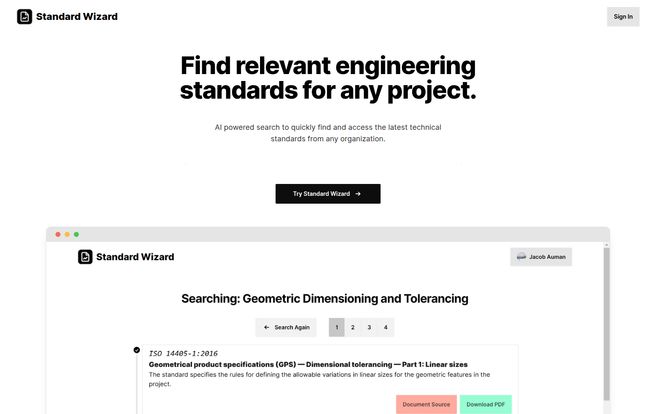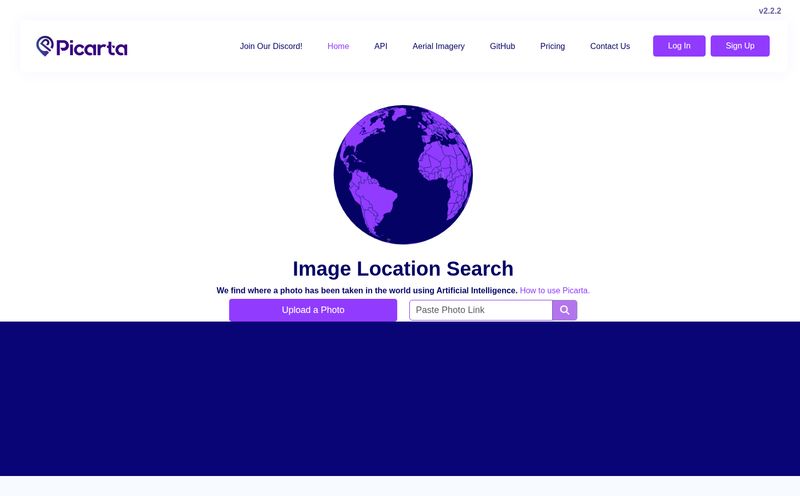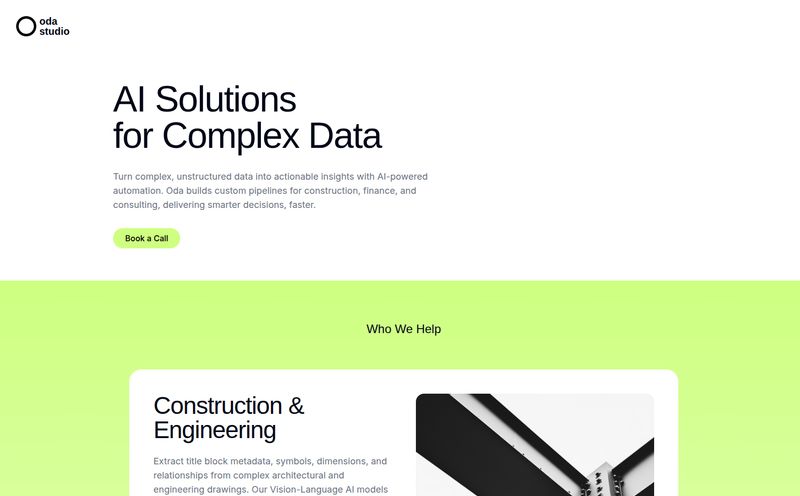If you're an engineer, a product designer, or anyone in a technical field, you've felt the pain. That sinking feeling when a project manager casually asks, “Hey, can you just double-check which ISO standard applies to this new widget’s material composition?”
Simple question, right? Wrong. What follows is a descent into madness. A frustrating scavenger hunt across clunky, outdated websites from various standards organizations. You're clicking through endless menus, fighting with terrible search functions, and trying to decipher document titles that seem intentionally obscure. It’s a time-suck. A soul-crushing, non-billable, why-did-I-choose-this-career time-suck.
I’ve been there more times than I can count. So when I stumbled upon a tool called Standard Wizard, my professional skepticism immediately kicked in. Another AI-powered “solution” promising to fix all my problems? Sure. But the premise was just too tempting to ignore: an AI search engine built specifically for finding engineering standards. I had to see if it was legit.
So, What Exactly Is This Standard Wizard Thing?
In a nutshell, Standard Wizard is like a super-smart librarian for the world of technical standards. Instead of you having to know which library (or standards organization website) to visit and then fumble with their ancient card catalog, you just tell the librarian what you’re looking for in plain language. It uses artificial intelligence to understand your query and then instantly points you to the most relevant standards from its massive database.
It's not trying to reinvent the wheel. It’s just making the wheel infinitely easier to find. The tool indexes over 28,000 standards from various organizations, providing you with summaries, context, and direct links to the source. It’s designed to cut through the noise and get you from question to answer in minutes, not hours.

Visit Standard Wizard
The Features That Genuinely Got My Attention
A tool is only as good as its features, but more importantly, it's only as good as the problems those features solve. Here’s what stood out to me.
AI-Powered Semantic Search Is The Real Magic
This isn’t your grandpa’s keyword search. You don’t have to type in “ISO 9001:2015” to get a result. Instead, you can type something conversational like, “quality management systems for manufacturing.” This is what they call semantic search. The AI isn’t just matching words; it’s understanding the intent behind them. For anyone who has struggled to find the right terminology to get a search engine to cooperate, this is a breath of fresh air. It feels less like operating a machine and more like asking a knowledgeable colleague for help.
Exact Lookups for When You’re in a Hurry
Of course, sometimes you do know exactly what you’re looking for. You have the standard number, say ISO 14405-1, and you just need to pull it up. Standard Wizard has a separate, dedicated function for this. You plug in the organization (ISO, ASME, etc.) and the number, and boom—there it is. No fuss. It combines the brilliance of smart search with the efficiency of a direct lookup. I like that they didn’t sacrifice one for the other.
AI Summaries are a Massive Time Saver
Okay, this feature is just plain cool. Once you find a standard, Standard Wizard provides an AI-generated summary. Think of it as the CliffsNotes for dense, jargon-filled technical documents. It outlines the key purpose, scope, and main points. This is incredibly powerful. You can quickly assess if a standard is actually relevant to your project before you go through the process of acquiring the full, often very expensive, document. It helps you triage information with incredible speed. I saw an example for a C programming language standard, and it neatly broke down the main topics—that alone would save a software engineer a ton of upfront reading.
My Honest Take on It All
After playing around with it, I have some pretty clear thoughts. It's not perfect, but it's impressively good at what it does.
What I Absolutely Love
The biggest win here is efficiency. This tool doesn't just do something new; it does something old and painful, but better. Dramatically better. The combination of semantic search and AI summaries can genuinely turn an afternoon of frustrating research into a 15-minute task. It gives you back your most valuable asset: time. Time you can spend on actual engineering and problem-solving, not on administrative grunt work.
The interface is also clean and straightforward. There's no steep learning curve. You can sign up with Google and be searching in under a minute. It just works.
Where It Could Improve
My main gripe, and it’s a small one for most users, is the lack of information on the AI model itself. As someone deep in the tech world, I'm always curious. What's under the hood? What's its training data? How does it handle very niche or newly released standards? The website doesn’t offer much detail here. For 99% of engineers who just need the right standard, this won't matter at all. But for the data nerds among us, a little more transparency would be nice. It’s a minor quibble, and it certainly doesn't stop the tool from being effective.
Let's Talk About The Price Tag
This is often the deal-breaker, but in this case, it might be the best feature. Standard Wizard has a refreshingly simple pricing model.
| Plan | Price | Features |
|---|---|---|
| Standard Wizard | $39 USD (One-time payment) | Lifetime access, 28,000+ standards indexed, AI semantic search, exact lookup, 1 year of updates, 24/7 support. |
Let that sink in. A one-time payment of $39. In a world dominated by monthly subscriptions, this feels like a relic from a better time. When you consider that a single standard document can cost upwards of $100 or $200, paying $39 to make sure you're finding the right one first is an absolute no-brainer. If this tool saves you even one hour of work, it has already paid for itself several times over. The included year of updates is also a nice touch, ensuring the index stays fresh.
Frequently Asked Questions About Standard Wizard
I had a few questions myself, so here are some answers to what you might be wondering.
- Is Standard Wizard a replacement for buying standards from ISO or ANSI?
- No, and that's an important distinction. Standard Wizard is a search and discovery tool. It helps you identify the correct standard and provides a summary. It then gives you a direct link to the source organization where you can officially acquire the document. It finds the needle in the haystack; you still have to pick up the needle.
- How up-to-date is the database of standards?
- The lifetime plan comes with one year of updates. This implies the index is regularly refreshed. For projects requiring the absolute latest revisions, it's always smart to cross-reference the publication date on the source organization's website, but this tool gets you to that page in record time.
- Is the $39 fee really a one-time thing?
- According to their website, yes. It's a single payment for lifetime access to the platform's features. It's so rare these days that it feels like a trick, but it seems to be the real deal.
- What engineering disciplines is this tool good for?
- Based on the breadth of standards (ISO, IEC, etc.), it seems applicable across many fields: mechanical, electrical, software (especially for hardware interaction and safety), civil, manufacturing, and quality assurance. If your job involves technical specifications, it's likely relevant.
- How does the sign-in process work?
- It's very simple. You can either use a one-click sign-in with your Google account or enter your email to receive a password-free "magic link." It's secure and hassle-free.
My Final Verdict
Look, I'm a cynical guy when it comes to new tools. Most are just flash-in-the-pan gimmicks. But Standard Wizard feels different. It targets a very real, very annoying problem that has plagued technical professionals for decades, and it solves it with elegance and efficiency.
It’s not going to do your job for you. It won’t replace your critical thinking or engineering judgment. But what it will do is clear away the pointless administrative brush, giving you a clear path to the information you actually need. It lets you focus on being an engineer, not a research librarian.
For a one-time cost that’s less than a nice dinner, it’s one of the easiest recommendations I’ve made in a long time. If you've ever lost a part of your soul searching for a standard, do yourself a favor and check it out.



